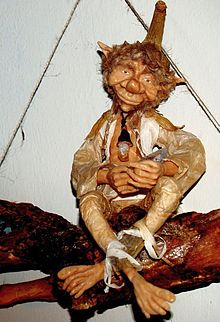duende
Hello, you have come here looking for the meaning of the word duende. In DICTIOUS you will not only get to know all the dictionary meanings for the word duende, but we will also tell you about its etymology, its characteristics and you will know how to say duende in singular and plural. Everything you need to know about the word duende you have here. The definition of the word duende will help you to be more precise and correct when speaking or writing your texts. Knowing the definition ofduende, as well as those of other words, enriches your vocabulary and provides you with more and better linguistic resources.

un duende
English
Etymology
Spanish duende and (especially in reference to Portuguese or Brazilian folklore) Portuguese duende. Doublet of duwende.
Noun
duende (countable and uncountable, plural duendes)
- A small, mischievous humanoid creature in Iberian (Spanish/Portuguese), Latin American, and Philippine folklore/mythology; an imp.
- For quotations using this term, see Citations:duende.
- (art) Heightened inspiration or passion, especially in flamenco.
- Personal charm. (Can we add an example for this sense?)
Anagrams
Norwegian Bokmål
Pronunciation
Verb
duende
- present participle of due
Anagrams
Portuguese
Etymology
Borrowed from Spanish duende, from Old Spanish duen de casa (“house master”).
Pronunciation
- Hyphenation: du‧en‧de
Noun
duende m (plural duendes)
- (Iberian folklore) a small humanoid creature who invades homes at night to carry out mischief and scare the residents
- (by extension, fiction) any small fictional humanoid, especially a mischievous or evil one
Usage notes
- This term is commonly used in fiction to translate the name of various creatures such as imps, gnomes and goblins.
See also
Spanish

Etymology
Inherited from Old Spanish duen de casa (“master of the house”). Compare Sicilian donni di casa. See more at dueño.
Pronunciation
Noun
duende m (plural duendes)
- (Iberian folklore) a small humanoid creature who invades homes at night to carry out mischief and scare the residents
- (Can we date this quote?), Raquel Cachafeiro Gil, El Duende de la Navidad, →ISBN, page 4:
- El duende de la Navidad vive en las ramas del manzano, pasa el tiempo subiendo y bajando, atareado con unir la luz del sol a la tierra y otras tareas similares. Cada año, en el invierno, se asoma a las ramas y mira a las estrellas y ve caer la […]
- (please add an English translation of this quotation)
- (by extension, fiction) goblin, leprechaun, pixie, elf, imp, brownie, gremlin, hobgoblin
- (by extension) charisma (the power to attract through personal magnetism and charm)
- Synonym: carisma
- (by extension) charm, magic
Derived terms
Descendants
- → Cebuano: dewende
- → Chamorro: duendes
- → English: duende
- → Portuguese: duende
- → Russian: дуэ́нде (duénde)
- → Tagalog: duwende, dwende; duende; duwinde; ruwinri
- → English: duwende
- → Ukrainian: дуе́нде (duénde)
See also
Further reading
- “duende”, in Diccionario de la lengua española, Vigésima tercera edición, Real Academia Española, 2014
